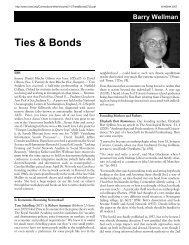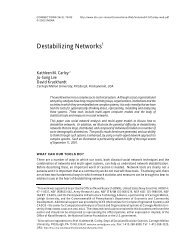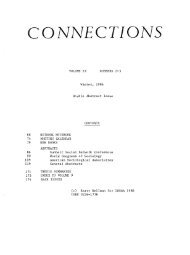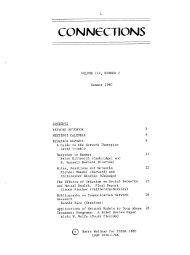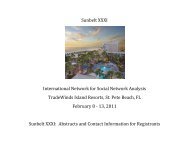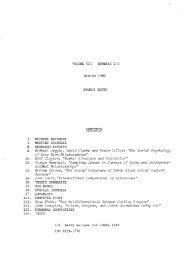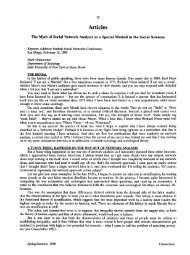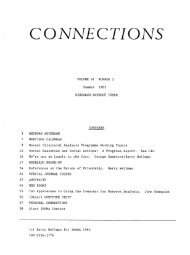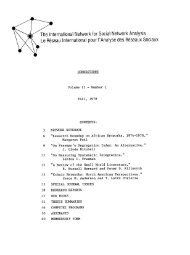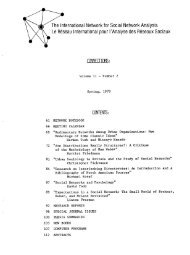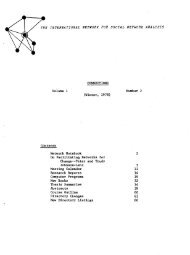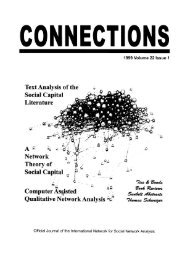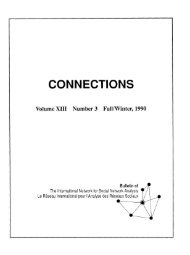CONNECTIONS - INSNA
CONNECTIONS - INSNA
CONNECTIONS - INSNA
Create successful ePaper yourself
Turn your PDF publications into a flip-book with our unique Google optimized e-Paper software.
<strong>CONNECTIONS</strong><br />
Egocentric Networks and Social Support<br />
Figure 1. “Typical” Family Sociogram<br />
Unique Social<br />
Support<br />
(M = 1.1)<br />
Shared Social<br />
Support<br />
(M =1.6)<br />
Unique Social<br />
Support<br />
(M = .6)<br />
Grandparents<br />
Father<br />
Mother<br />
related to overall support quality. To explore<br />
whether the overall quality of the source of<br />
social support was moderated by parent sex,<br />
several interaction terms were created: (1) being<br />
a shared source of support and sex of parent and<br />
(2) type of support (instrumental, emotional,<br />
health information) and sex of parent. None of<br />
the interaction terms were significant. For both<br />
mothers and fathers, more emotional and<br />
instrumental support received from family<br />
members increased overall support quality, and<br />
this relationship was not moderated by parent<br />
sex.<br />
To answer questions regarding fathers’ inability<br />
to receive support, the differences between<br />
mothers and fathers in unique social support<br />
were explored using four paired samples t tests.<br />
Therefore, only parents’ unique sources of social<br />
support were included in this analysis (N = 68).<br />
In comparison to fathers (M = 2.08, SD = 1.07),<br />
mothers received more instrumental support<br />
from unique sources of social support (M = 2.57,<br />
SD = .93), t(66) = 2.00, p < .05, d = .49. From<br />
their unique sources of social support, the<br />
overall quality of social support for fathers (M<br />
=6.40, SD = .90) was significantly less than the<br />
support mothers received (M = 6.80, SD = .37),<br />
t(66) = 2.17, p < .05, d = .58.<br />
Table 1. All Means And Standard Deviations By Sex Of Respondent<br />
Standard<br />
Mean Deviation Sample Size<br />
Men Women Men Women Men Women<br />
No. Sources of Support 3.77 3.13 1.45 1.81 20 20<br />
Emotional Support 2.13 2.09 .85 1.08 20 20<br />
Instrumental Support 2.36 2.39 .92 .97 20 20<br />
Health Care Support 1.07 1.20 .97 1.14 20 20<br />
Overall Social Support 6.23 6.11 1.17 1.80 20 20<br />
% Sources Female 64 73 80 69<br />
% Sources Family 63 63 80 69<br />
_____________________________________________________________________________________________<br />
46



